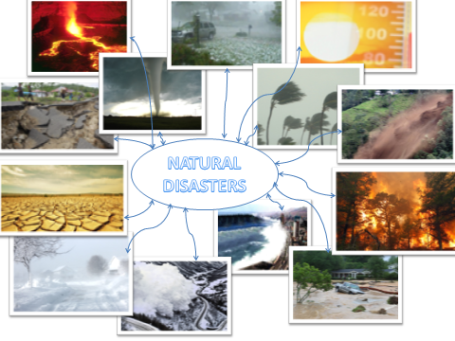Урок "Nature disasters"
Тема уроку: Природні катастрофи. Відпрацювання лексики, ідіом, граматичних структур
Мета уроку: активізувати знання учнів лексичних одиниць з теми;
удосконалювати навички читання і говоріння;
розвивати мовленнєві навички, навички аудіювання, розвивати мислення та увагу учнів.
виховувати інтерес до природних явищ; готовність правильно поводити себе в екстремальних умовах.
розширювати кругозір учнів, стимулювати і підтримувати інтерес до іноземної мови.
Обладнання: ІКТ, підручник , картки для індивідуальної роботи, презентація Power Point, текст для читання, відеокліпи.
І. Підготовка до сприйняття іншомовного мовлення
1. Greating
T.: Good morning, dear friends!We live in a magic world. This wonderful world is our nature. Nature gives us life. Nature teaches us to be kind and clever, attentive and creative. It teachesto understand the world around us. But our Planet is very fragile. Every year small and big natural disasters occur in different parts of the world.
2. Aim
T. Read the poem and define the topic of the lesson (слайд 1)
Defend tender nature wherenever you are
Its views can be seen from a train, from a car,
Sunsets and bright lightning,
And beautiful forests,
Skyline and background,
Tornado at moments,
End comes to all nightmares,
Rain cleans all footprints.
Support tender nature and
Practice good Things
Слайд 2

T.: As you guessed the theme of our lesson is “Natural disasters”. Today we are going to speak about different kinds of natural disasters. Clear up how these natural disasters affect humans and what we should do to live with them and to protect ourselves from different natural catastrophes.
By the end of the lesson you should be able:
• to recognize and understand new words and word combinations in the text;
• to read and understand the gist and details despite the natural difficulties;
• to participate in common conversational exchanges about the topic of today's lesson.(слайд 3)
3. Warming up.Phonetic drilling (слайд4)
When the weather is wet, we must hot fret
When the weather is cold, we must not scold
When the weather is warm, we must not storm
But be thankful together, what ever the weather
Teacher: I`d like you to fill in a self-assessment card at the end of the lesson.
|
Skills |
Points (0-3) |
|
1. I can tell many names of natural disasters |
|
|
2. I can understand the text in English easily |
|
|
3. I can communicate on the topic |
|
|
4. I can work in group |
|
|
5. I know safety measures |
|
|
6. I`ve got good listening skills |
|
|
Total |
|
Results:
18-13 – a very good result
12-7 – rather well
6-0 – not good
ІІ. Основна частина уроку.
- Listening.
А) Учні прослуховують відео. Відеозапис ( Адам.)
Б) Brainstorming, quiz «Name Disaster»(слайди 5-20).
- Reading
Natural disasters like earthquakes, tornado, tsunami and floods happen more frequently nowadays. There are many reasons why they occur, but the main one is related to human activity on Earth which often has a negative impact on our environment.
All kinds of disasters are usually very damaging. Many dwellings, roads and even whole streets and cities are ruined. The number of victims usually terrifies as hundreds or even thousands of people get injured or die in disasters. However, each disaster has a different nature.
For example, an earthquake is the result of the tectonic plates’ movement which leads to the shaking of a certain area on land. Earthquakes destroy buildings and people usually become victims because they get stuck or killed under the rubble.
Tornado is also a natural disaster which looks like an enormous column of the wind which lifts cars, bicycles, furniture and many other things. It is also called a twister and it can be very dangerous if touches the surface of the ground or water.
Flood in its turn happens when rivers burst their banks. Most extended floods damage cities and wash away whole populated places. Tsunami is another natural disaster which arises as a series of huge waves caused by underwater earthquakes.
Thus, there are many natural disasters which are dangerous for all of us. We should be careful and treat our planet better in order not to die with it.
Match the words with the appropriate definition:
Для закріплення вивченого матеріалу учні виконують завдання із лексичним матеріалом, де їм потрібно знайти відповідний переклад слів та з’єднати слова із відповідним перекладом. (слайд 21)
|
|
|
|
|
|
|
|
|
|
|
|
|
|
|
|
|
|
|
|
|
|
|
|
|
|
|
|
|
|
|
|
|
|
|
|
|
|
|
|
|
|
|
|
|
|
|
|
Answers 1f, 2l, 3r, 4a, 5g, 6m, 7s, 8b, 9h, 10n, 11t, 12c, 13i, 14o, 15u, 16x, 17j, 18p, 19v, 20d, 21k, 22q, 23w, 24e
ІІІ. Заключна частина уроку
- Homework
⸻ Learn new words and combinations on the topic Disaster
⸻ Ex.3, p. 151
- Summing up
-
Дякую за матеріал. Мені став в нагоді


про публікацію авторської розробки
Додати розробку
